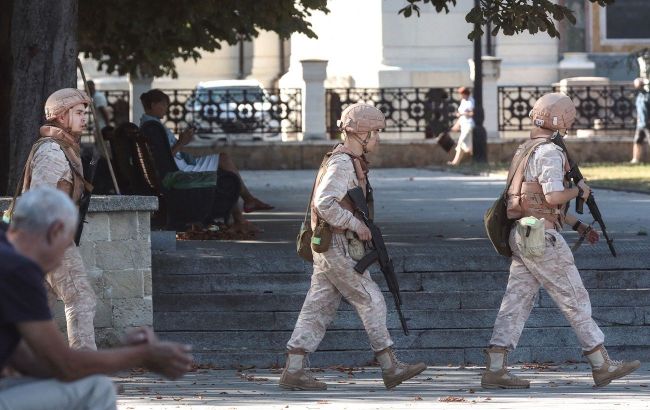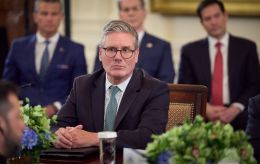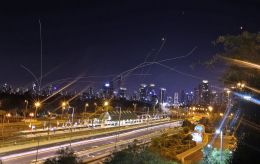Russia tries to prevent panic over explosions in occupied Crimea: ISW
 Russian military in occupied Crimea (Getty Images)
Russian military in occupied Crimea (Getty Images)
According to analysts at the Institute for the Study of War (ISW), the Kremlin has become increasingly sensitive to the conflicts arising in the Russian information space between influential media personalities and "war correspondents" regarding reports on failures in the temporarily occupied Crimea and on the frontlines in Ukraine. The Kremlin is trying to contain the panic that has been arising among Russians.
This situation has further exposed the shortcomings within the "war correspondent" community, according to experts.
On August 2, a Russian pro-war blogger sharply accused other well-known "war correspondents" of being "imbeciles" who support "provocative publications" and "crazy criticism" of the Russian Ministry of Defense. The reason behind such harsh statements was the bloggers' publication of images showing the aftermath of recent Ukrainian strikes in the occupied Sevastopol and the Chonhar bridge in Crimea, which some sources believe could "spread panic."
A notorious pro-Russian Ukrainian blogger, who supports the Kremlin, additionally accused one of the critical "war correspondents" of stealing crowdsourcing funds intended for Russian forces.
The ISW highlighted that both of these articles have drawn significant attention from other Russian military commentators, many of whom supported the channels that came under attack for said that the whole issue revolves around the publication of photos of alleged Ukrainian strikes on objects in occupied Crimea, emphasizing that the original images were taken from Ukrainian Telegram channels.
Another well-known Russian blogger claimed that the dispute over posting images of the strike aftermath in Crimea has become so tense that it caught the attention of the Crimean Federal Security Service and the so-called head of the Crimean occupation "administration," Sergey Aksyonov, possibly due to their interest in preventing panic on the peninsula.
This disagreement surrounding the two "war correspondents," along with the accompanying accusations, demonstrates that the issue of strikes on Crimea is "clearly a sensitive point in the Russian military information space," as stated in the report.
The ISW analysts said that previously, after the Ukrainian Armed Forces' strike on the Chonhar bridge on July 29, the vast majority of Russian bloggers kept silent, and only a few selected channels reposted images of the inflicted damage in the following days.
According to experts, the absence of discussion among "war correspondents" after the strikes on the Chonhar bridge suggests that the Kremlin may have officially instructed bloggers to keep it down about the Crimean strikes. This once again confirms ISW's previous assessment and highlights the fact that the coverage of events on the peninsula has created significant tension in the Russian information space.
"The Russian authorities, including the Crimean occupation 'administration,' are keen to restrict the dissemination of information about the strikes and their consequences for Russian logistics through the occupied peninsula out of fear that this information will cause panic among the population and cast doubt on Russia's ability to effectively defend its occupied territory," the publication read.
Key findings:
- The highest echelons of the Russian military command may have directed milbloggers to stay silent about problems that can be directly blamed on the Russian military command.
- Russian forces conducted a drone strike on the night of August 1-2 that destroyed port infrastructure in the Odesa region including 40,000 tons of grain.
- Russian Airborne Forces (VDV) Commander Colonel General Mikhail Teplinsky announced the formation of up two new VDV regiments and the reestablishment of the 104th VDV Division by the end of 2023. Teplinsky’s announcement indicates that he maintains his position and the public support of the Russian MoD following rumors of his arrest, possibly as a result of his affiliations with the Wagner Group, in mid-July.
- The Russian Ministry of Defense (MoD) officially provided weapons and vehicles to the Belgorod and Kursk regions' Territorial Defense forces on August 2, reallocating conventional military assets as a part of the Kremlin’s efforts to steadily expand Russia’s internal security capabilities following the Wagner Group’s armed rebellion on June 24.
- Ukrainian forces continued counteroffensive operations on at least three sectors of the front and reportedly advanced near Bakhmut on August 2.
- Russian forces conducted offensive operations along the Kupyansk-Svatove line, near Kreminna, around Bakhmut, and along the Avdiivka-Donetsk City line and advanced in some areas.
- Russian civilians are increasingly targeting military registration and enlistment centers across Russia as a result of what Russian sources claim are targeted scam calls.
- Russian President Vladimir Putin pushed the Kremlin narrative of “Novorossiya” and announced Russian government initiatives to provide books to occupied territories of Ukraine on August 2.
Attacks on the Chonhar bridge and explosions in Crimea
The explosions in the temporarily occupied Crimea have become a common occurrence. On August 2, powerful explosions were reported, leading to Russians closing the Kerch Bridge. Explosions were also reported in Simferopol, Novofedorivka, and Gvardiiske.
On August 1, there was another report of an explosion in Sevastopol. It was so powerful that it could be heard in Bahchisarai, 30 km away from the city.
On July 29, the Ukrainian Armed Forces conducted a second successful attack on the Chonhar bridge (the first was on June 22).
Russian collaborator from Kherson, Volodymyr Saldos, claimed that the Ukrainian attack on the railway in Chonhar was repelled, but photos of the damaged tracks that were published later contradicted his statement.
According to military expert Oleksii Hetman, the Ukrainian Armed Forces continue to carry out precise actions, disrupting the enemy's logistics, and Crimea could soon become an "island."

